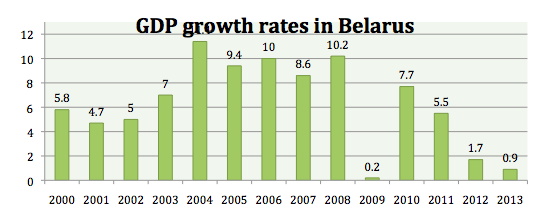Outlook for Belarus economy: slow growth and double-digit inflation
Growth in Belarus' economy is expected to reach 2.1 percent in 2014 and 3 percent in 2015.
 Belarus GDP from 2000 to 2014
Belarus GDP from 2000 to 2014
The Belarusian economy in the next 18 months will face slow growth, coupled with relatively smooth currency devaluation and double-digit inflation. This is the conclusion of experts at the Research Center of the Institute for Privatization and Management (IPM) and the German Economic Team (GET) in Belarus.
According to their forecast, the Belarusian economy in 2014 potentially will grow by 2.1 percent, and in 2015 GDP growth is likely to reach 3 percent. Economists believe that the revitalization of exports and domestic investment demand will cause the growth. “In the near future GDP growth rate will depend on access to sources of external funding,” said Irina Tochitskaya, the academic director of the IPM Research Center.
The economic authorities of Belarus show a willingness to moderate exchange rate policy in order to make covering the current gap in financing possible. Therefore, Belarusian and German experts expect “smooth devaluation of the Belarusian ruble” by the end of 2014 to 11,000 BYR per 1 USD, and by the end of 2015 to 12,500. Already since the beginning of the year, the dollar in Belarus has risen by approximately 7 percent to 10,170 BYR.
The smooth devaluation of the national currency, though, will speed up a rise in prices, a negative situation which is also influenced by inflation expectations and expanding consumer demand. In 2014, another important factor contributing to inflation will be an expected increase in administratively regulated prices (housing and community amenities, transport, foodstuffs, etc.).
In the absence of additional internal shocks in the money market, experts expect growth of consumer prices by 17.8 percent on average in 2014 and 13.2 percent in 2015. It’s an important point that in May, inflation in Belarus accelerated to 2.2 percent vs. 1.6 percent in April, and since the start of the year prices have already risen by 8.9 percent. Belarusian authorities initially predicted 11 percent by the end of the year.
Maintaining economic growth in2014 will require increased fiscal stimulation through government policy measures, which presumably will lead to a consolidated budget deficit (1.4 percent of the GDP). However, experts do not expect the sharp easing of fiscal policy because of the high risk of inflation. Economists believe that in 2015 the 1.5 billion USD increase of income from export duties on oil products will be enough to recover the budget surplus (0.3 percent of the GDP).
There are important caveates to this forecast: the price of oil in 2014 must average at least 97 USD per barrel, and in 2015, at least 92 USD. Belarus must import 22 million tonnes (392 million barrels) of oil from Russia this year as expected, and 23 million tonnes (409 million barrels) in 2015. Over the next 18 months, the price of gas imported from Russia to Belarus must average 165 USD per thousand cubic meters. This year privatization receipts must amount to 1 billion USD, and in 2015 – 1.5 billion USD.
In addition, the government must also succeed in plans to obtain 3 billion USD in credit by the end of 2015. Next year it will issue a 1.5 billion USD Eurobond. “Before we were upbeat about privatization,” said IPM Research Center’s Tochitskaya, “and the attraction of foreign direct investment. But now we have a conservative forecast. We do not see opportunities for big privatization deals.”
This forecast for 2014-2015 could hardly be called sustainable development. Moreover, under these circumstances, a number of “diseases” of the national economy can progress (e.g., labor migration, the loss of competitive edge, the decline of export markets). Most prominently, this development path can lead to a new threat, according to economists – where payroll embarrassment negatively influences economic growth in coming years.
The structural weakness in the economy (and the market’s resulting low potential for growth) is still a top-priority problem in Belarus. Alexander Chubrik, the director of the IPM Research Center, sees no reason to be optimistic about any new economic policies, this despite the recent bold and unexpected statement from Belarusian Minister of Economy Nikolai Snopkov. The minister, who has occupied the office since 2009, boldly stated that in 2015, Belarus shall focus more on reducing inflation than on growing the economy.
The authorities have targeted economic growth in Belarus next year to reach 2.6 percent, while the inflation rate, if all goes to plan, will not exceed 12 percent. “The promise that next year the [economic] growth will be sacrificed and the monetary stability will be a priority is good news,” said Chubrik. “But we have a [presidential] election in a year and a half, and in these circumstances a new economic policy won’t be implemented. Also, the idea of designating special importers is not encouraging.”

Leave a comment